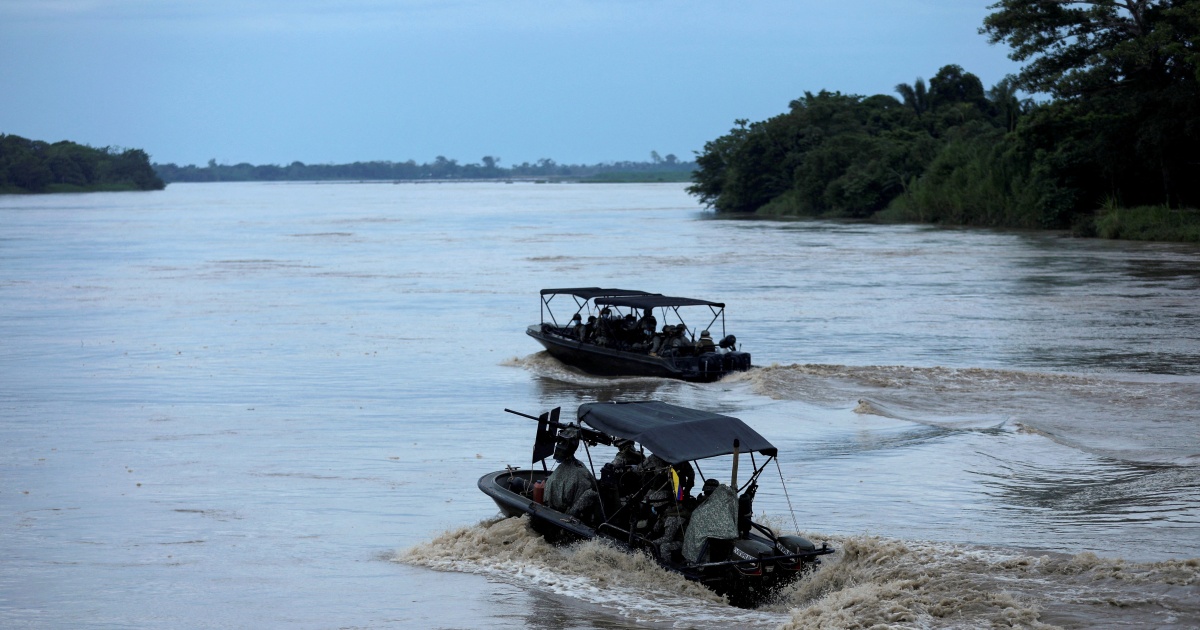Colombia: At least 23 dead in clashes between armed rebel groups
Bogota, Colombia – Violent confrontations between Colombian rebel groups near the country’s border with Venezuela have left at least 23 people dead, Defence Minister Diego Molano told a news conference late on Monday.
Fighting broke out over the weekend in Arauca as members of the National Liberation Army (ELN) fought with dissidents of the Revolutionary Armed Forces of Colombia (FARC), who reject a 2016 peace deal, that saw the group demobilise, bringing an end to five decades of armed conflict in the country. The ELN is Colombia’s largest remaining armed rebel group.
The groups were fighting over control of illegal economies such as drug trafficking, according to a statement from Colombia’s army.
Colombia’s human rights ombudsman earlier said at least 16 people had been killed and a dozen families forced from their homes.
The ombudsman’s office expressed “deep concern for the escalation of the armed conflict in Arauca due to the confrontation between illegal armed groups that put the civilian population at grave risk”.
The office called on local authorities to be present and protect civilians in the border area, which has seen an increase in violence linked to armed groups since early 2021.
“In the last few hours there have been homicides, threats, illegal detentions, mass displacements and risk of forced displacement in border municipalities, specifically in Tame, Fortul, Saravena and Arauquita,” it said.
Security reinforcements
Juan Carlos Villate, a government official who deals with human rights issues in Arauca, told the local W Radio station on Monday morning that “the number [of deaths] could increase to 50”. Villate said the violence was the worst he had seen in the region in the last 10 years.
Meanwhile, Arauca’s mayor, Etelivar Torres Vargas, said in a statement on Sunday that he “strongly rejects the violent events”, which he said “directly caused shock, fear and anxiety [among] local inhabitants”.
Colombian President Ivan Duque said a meeting with security officials was held since the violence broke out, while security reinforcements were sent to Arauca in the aftermath of the clashes.
Molano also said on Monday that another meeting would take place in Arauca in the afternoon on how to best protect the local population and control the border area with Venezuela.
The Colombian government has for several years accused Venezuelan President Nicolas Maduro of harbouring FARC dissidents and ELN fighters in Venezuela’s border area – an accusation Caracas continually denies.
Unanswered questions
Adam Isaacson, a researcher at the Washington Office on Latin America think-tank, said the fighting may have broken out over control of Arauca, a hugely strategic department that shares a long, uncontrolled border with Venezuela.
“Everything from drugs, to stolen cattle, to kidnapped people crosses,” he told Al Jazeera. “Armed groups tax everything, even beer and food. Also, there’s a lot of oil in Arauca, which means there’s a lot of extractive businesses that armed groups could extort.”
Isaacson said Arauca is a stronghold of the ELN inside Colombia, and that when he visited in 2019, he was told a non-aggression truce between the ELN and FARC dissidents was in place there.
“That non-aggression agreement is clearly over as of this past weekend,” he said. “Why now? Probably the ex-FARC have gotten stronger, especially the 10th Front dissidents who stood their ground against the Venezuelan forces last year, and now they have a bigger presence.”
Juan Pappier, a senior Americas researcher at Human Rights Watch, told Al Jazeera that the alliance between the ELN and the Martin Villa 10th Front, a FARC dissident group, “appears to be breaking apart”.
“We have received worrying reports of deaths, forced displacement, and kidnappings. Authorities should take urgent steps to protect the civilian population and assist victims,” Pappier told Al Jazeera.
“For years, the conflict between the FARC and ELN tormented people in Arauca and Apure. They can’t be left to their own devices as a new version of this conflict appears to [be coming] alive in the region.”
Still, Isaacson said many questions remain unanswered about Sunday’s violence.
“We don’t know which groups went on the offensive or what triggered it, or whether this is just a flare-up or the beginning of a new war,” he said. “But certainly from this past weekend, if the death toll and displacement numbers we are seeing are at all accurate, this is one of the most serious humanitarian situations we have seen in Colombia in recent years.”













